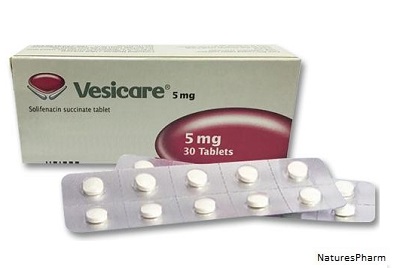What is Vesicare?
Vesicare is a medication from antispasmodic group, which is usually used to decrease smooth muscles tone of the urinary tract.
Urgent urinary incontinence with frequent urination is successfully treated with Vesicare. Also, physicians often recommend these pills for those who have an overactive urinary bladder syndrome. Vesicare should be used for long periods of time to demonstrate the most of its effectiveness. Also, the intake of pills should be regular, so it is recommended to have some exact time of a day when you will be using these tablets.
Usually the treatment starts with the dosage of 5 mg once a day (for adult patients). Vesicare pills should be taken with a glass of water and regardless of eating food. The dosage may be changed up to 10 mg daily in case of necessity.
Simultaneous use of other medications, which have anticholinergic effects, is able to cause serious side effects. An interval between the therapy with Vesicare and usage of other anticholinergic drugs is needed (there should be nearly 7 days between the intake of different medications). Solifenacin succinate (the active ingredient of Vesicare) therapeutic effect can be reduced with concomitant usage of cholinergic receptors agonists.
Vesicare can cause side effects related to anticholinergic action of its active ingredient, which are usually weak or moderate. The reported side effects directly depend on the dosage of the medication. The most frequent adverse reaction is dry mouth (it was observed in 11% of patients who received a dose of 5 mg a day).
Recommendations for Use
Precautions and Contraindications
These pills are contraindicated for people who have a hypersensitivity to one of active ingredients, for people with delayed urination, with serious gastrointestinal diseases, closed corner of glaucoma, during hemodialysis, with acute liver failure and myasthenia gravis. Also, the drug is contraindicated for those who have chronic renal impairment or hepatic insufficiency of moderate severity, which are treated with CYP3A4 inhibitors such as ketoconazole.
It is obligatory to establish the likelihood of other possible reasons leading to problems with urination before starting the treatment with these pills. Proper antibiotic therapy should be provided if there is an infection of the urinary tract.
Such tablets as Vesicare should be prescribed for those who have obstruction of the bladder outlet (leading to urinary retention risk) under a strict control of medical staff. People who have intestinal motility disorders or the risk of motility of the gastrointestinal tract should contact their healthcare provider before taking the medication. Those who have autonomic neuropathy, severe renal and cirrhosis impairment should have a dosage, which does not exceed 5 mg. Those who simultaneously receive ketoconazole treatment or have a hiatal hernia should notify their healthcare provider about these circumstances.
Drug Interactions
The usage of these pills does not influence the pharmacokinetic interaction between solifenacin and combined oral contraceptive pills (ethinyl estradiol/levonorgestrel). Also, it does not have an impact on pharmacokinetics of warfarin and digoxin. To avoid any unexpected drug interactions, you should notify your doctor about any drugs you are using at the moment (even if these are herbal drugs or non-prescription medications).
Side Effects
Other side effects reported in clinical studies of Vesicare involve the following: gastroesophageal reflux disease, coprostasis, nausea, dyspepsia, urinary tract infections, drowsiness, blurred vision (disturbance of accommodation), disturbance of taste, dry eyes, fatigue, leg edema, dry throat and skin, difficulties with urination and urinary retention.


